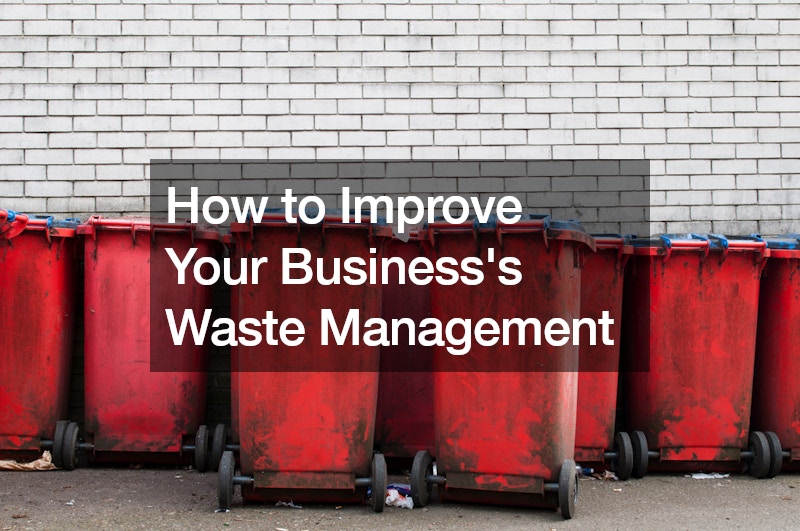In today’s environmentally conscious world, effective waste management is not only a legal requirement but also a moral obligation for businesses. Implementing proper waste management practices not only reduces environmental impact but also enhances operational efficiency and cost-effectiveness. From recycling initiatives to efficient disposal methods, there are several strategies businesses can employ to improve their waste management processes. In this article, we’ll explore practical steps to enhance waste management in your business, including the utilization of a reliable dumpster rental service.
Business waste management involves the efficient handling, recycling, and disposal of waste generated by commercial activities.
It encompasses strategies to minimize waste generation, optimize recycling efforts, and ensure compliance with environmental regulations. Effective waste management practices contribute to sustainability, cost reduction, and environmental responsibility in business operations.
Conduct a Waste Audit:
This involves assessing the types and quantities of waste generated by your business. This information can help identify areas for improvement and guide the development of tailored waste management strategies.
Implement Recycling Programs:
One of the most effective ways to reduce waste is by implementing recycling programs within your business. Provide designated recycling bins for materials such as paper, plastic, glass, and metal. Educate employees about proper recycling practices and encourage their participation. Additionally, consider partnering with recycling companies to ensure collected materials are properly processed and reused.
Reduce Single-Use Items:
Single-use items such as disposable cups, plates, and utensils contribute significantly to waste generation. Implement measures to reduce the use of these items within your business. For example, provide reusable alternatives or encourage employees to bring their own reusable containers. By minimizing single-use items, you can decrease waste output and promote sustainability.
Invest in Waste Segregation:
Proper segregation of waste is essential for effective waste management. Implement a system for segregating different types of waste, including recyclables, organic waste, and hazardous materials. Provide clearly labeled bins or containers for each waste stream to facilitate proper disposal. This segregation not only streamlines waste handling processes but also ensures compliance with regulatory requirements.
Explore Composting Options:
Composting organic materials such as food scraps and yard waste diverts them from landfills and produces nutrient-rich compost for landscaping or agricultural use. Partnering with local composting facilities or investing in on-site composting equipment can help your business reduce its environmental footprint.
Optimize Waste Collection:
Efficient waste collection is crucial for maintaining a clean and organized business environment. Consider partnering with a reputable dumpster rental service to ensure timely and reliable waste removal. Choose appropriately sized dumpsters or bins to accommodate your business’s waste volume and schedule regular pickups to prevent overflowing containers.
Educate and Train Employees:
Effective waste management requires the cooperation and participation of all employees. Educate staff about the importance of waste reduction and proper disposal practices. Provide training on waste segregation, recycling procedures, and the use of designated waste disposal areas. By empowering employees to be proactive in waste management, you can create a culture of sustainability within your business.
Monitor and Evaluate Performance:
Continuous monitoring and evaluation are essential for assessing the effectiveness of your waste management efforts. Track key metrics such as waste diversion rates, recycling volumes, and disposal costs to gauge progress over time. Use this data to identify areas for further improvement and adjust waste management strategies accordingly.
Effective waste management is an ongoing process that requires dedication and commitment from businesses. Beyond the initial implementation of waste reduction strategies, continuous improvement is essential to adapt to changing waste generation patterns and environmental regulations. Regularly review and update your waste management policies and procedures to ensure they remain effective and aligned with your sustainability goals.
Furthermore, consider engaging with industry organizations and environmental agencies to stay informed about best practices and emerging trends in waste management. Networking with peers and participating in industry events can provide valuable insights and opportunities for collaboration.
By prioritizing waste management and incorporating it into your business’s core values, you can not only minimize environmental impact but also enhance your brand reputation and customer loyalty. Embrace sustainability as a fundamental aspect of your business operations, and strive to be a responsible steward of the environment for the benefit of future generations.
In conclusion, improving your business’s waste management practices is not only beneficial for the environment but also for your bottom line. By implementing recycling programs, reducing single-use items, investing in waste segregation, and optimizing waste collection, businesses can minimize their environmental impact and enhance operational efficiency. Partnering with dumpster rental services and fostering employee engagement are also critical steps in achieving effective waste management. By adopting a comprehensive approach to waste management, businesses can contribute to a cleaner, greener future while realizing cost savings and operational benefits.
.






